Recently resigned Ethiopian Prime Minister Hailemariam Dessalegn speaking in China, May 15, 2017. Lan Hongguang/Xinhua News Agency/Press Association. All rights reserved.
The crisis in Ethiopia has suddenly gained momentum and reached a tipping point. Things could go either way. The country could dig itself even deeper, with consequences that don’t bear thinking about. Or there could be a broad realisation that Ethiopia is “at the precipice”, bringing a surge of realism and pragmatism that would finally start a process of political rebuilding on solid, inclusive and lasting foundations.
This will require compromise, an attitude that is, to say the least, somewhat unfamiliar in traditional Ethiopian culture. All the actors will have to find a balance between what they would like to get and what they can get, between the short-term and the long-term. But time is short, numbered in weeks, maybe days.
Capsizing
The system of government introduced in 1991, and monopolised by Meles Zenawi from the early 2000s, is irremediably dead. It had been in its death-throes since Meles’s sudden demise in 2012. The snap resignation of Prime Minister Hailemariam Dessalegn on February 15 marked the serving of the official death certificate.
He had privately indicated his intention to resign, but not until after the planned spring congress of the governing coalition of the four major ethnic parties: the Amhara National Democratic Movement (ANDM), the Oromo Peoples’ Democratic Organisation (OPDO), the Tigrayan People’s Liberation Front (TPLF) and the Southern Ethiopian People’s Democratic Movement (SEPDM).
The reason he gave for his resignation, as “vital in the bid to carry out reforms that would lead to sustainable peace and democracy”, is particularly open to question in that he was a well-known reformist. Did he quit because he was pushed or because he had become aware of his powerlessness? In the midst of the worst storm that the country has experienced for decades, he was the official captain of a crew that had become so disparate, divided and disloyal that his vessel was pitching and yawing wildly.
Hailemariam probably did not want to be held responsible in the event that it should capsize. He may also have hoped that his departure would back the ruling coalition into a corner and leave it with no other alternative than to set a course out of the storm and form a new crew capable of following it.
Hegemony?
In parallel with this decline in central power, the respective strength of the coalition’s regional parties, starting with the OPDO, has continued to rise to the detriment of the TPLF, which had dominated the coalition for more than two decades despite the fact that Tigrayans account for only 6% of the nation’s population. And alongside this centrifugal movement, opposition forces – both legal and illegal, national and anchored in the diaspora – were growing in power, after long years of repression had kept them in the wilderness.
As the body politic fragments and levels out, the protests show no sign of abating, mainly in Oromya, even though not a week goes by without its death toll of victims of the security forces. Oromo complaints of marginalisation have gradually shifted towards claims of what they believe they deserve as the country’s most populous and richest region: to be at the top.
The home strike on February 12 and 13 paralysed Oromya as far as the gates of Addis Ababa, demonstrating that a blockade of the capital would not be inconceivable. Unprecedented crowds in multiple cities celebrated the return of the most prominent political prisoners: around 6,000 have been freed since a gradual amnesty announced at the beginning of January. Buoyed up by its successes, the street – at least in Oromya – could misinterpret the disarray of the EPRDF to the point that it could believe itself to have achieved an hegemonic position that none can deny it.
However, this popular movement, mostly spontaneous and therefore loosely organised, has its shadow side, at least on the margins. While the primary responsibility for the forced displacement of almost a million people – mostly Oromo, a minority Somali – essentially since September 2017, described as “interethnic clashes”, is attributable to the Somali authorities, at grassroots level it has stirred up ethnic tensions that were previously latent, or at most sporadic and sparse.
Ethnic clashes and nationalist hysteria
The frequent claim that multi-ethnic communities have lived in peace for centuries is both true and false. “Ethnic clashes” have always taken place around basic issues: land, pasturage, water. They have flared up with all the major upheavals and subsequent power vacuums of recent decades, such as the agrarian reforms of 1975 and the introduction of the federal system in 1992-1993.
The national parties, mainly OPDO and ANDM, have backed the quest for “national identities” and claims of “national rights” in order to assert themselves vis-à-vis the TPLF and ride the wave of protests. Some of their leaders have even given their imprimatur, at least through inaction, to outbursts of nationalistic hysteria that itself also masks well-known interests, ultimately leading to “ethnic cleansing” accompanied by dispossession and pillaging.
Recently, thousands of Tigrayans, identified with their governing elite, whose powers and resources are disproportionate, were driven out of the Amhara region. Members of the Kemant, a subgroup of the Agwa ethnicity, were massacred there. Students have had to flee their universities to escape a sometimes murderous wave of “ethnic purification”.
“Ethnic clashes” are proliferating. In some cases the regional or local security forces do nothing to stop them. A symptom of this odious climate: on websites accessible in Ethiopia , especially in the comments sections, overtly racist interethnic attacks, which would be an offense anywhere else, are flourishing as never before.
Fundamental divide
Finally, in parallel with this threefold process – disintegration in the system of power, continuing protests with sometimes violent outbursts, and rising ethnic hysteria – a fundamental divide is forming, even if it does not reach the light of day. The ultra-dominant official rhetoric is reformist, founded on a key expression: “deep renewal”. However, websites (like Aigaforum.com or Tigraionline.com) that say out loud what is only whispered in certain circles of the TPLF, insist that the only effect of the government’s acts of appeasement is to make the protesters even more demanding and exacerbate the disorders.
In this view, the only way to put an end to both is to employ every possible means in a trial of strength. In addition, questions remain about some interventions by federal forces – army, police, the elite Agazi unit – carried out without the prior agreement of the regional authorities, a legal requirement, and frequently accompanied by the use of disproportionate violence. These forces are disciplined and battle hardened, so individual excesses or blunders are highly unlikely. These cases of autonomous and brutal conduct, running counter to official policy, are undoubtedly commanded, or at least tolerated, by the heads of these units, although they cannot be unaware that they are an essential contributor to escalations in radicalisation and violence.
How to draw back from the precipice
Drawing back from the “precipice” requires an urgent Copernican revolution. It can be built on four cornerstones.
– Apart from a few very marginal elements, no one fundamentally questions the Constitution. It can therefore provide the frame of reference for any change.
– None of the members of the ruling coalition envisages putting an end to it, however formal and forced its perpetuation may be. They all know that the coalition’s official collapse could devour them all. At least in the short term, it is hard to find any sign of any alternative coalition that could form, let alone govern. If the EPRDF broke up, the probability that Ethiopia would become a “failed state” is very high. However weakened it is, there would still be one hand on the helm.
– At no point, so far, has the spearhead of protest in Oromya, the Queerroo (youth), called for armed struggle. This is a major change: in the history of Ethiopia, power has always come through the barrel of a gun. However, there is a growing radical fringe which believes that taking up arms will be sufficient to put an end to the regime.
– Finally, even the opposition, which was calling for the immediate formation of a transitional government of national unity, has more or less abandoned this demand. It was unrealistic. The EPRDF has just rejected it. If it had agreed, its divisions and the scattered nature of the opposition would have bogged down the formation of such a government in interminable bargaining and one-upmanship and, once in place, would have condemned it to impotence.
However, the longer the power vacuum continues, the closer the “precipice” approaches. Regardless of its divisions, the EPRDF must at all costs make the internal compromises needed to appoint a credible prime minister and government, and then actually support them so that they can take back the helm. Of course, the appointment of Lemma Megersa, although he cannot legally occupy this position, would satisfy Oromo protesters. However, it would require such major concessions in the light of what we know about the balances of power, that another Oromo or Amhara figure, or even a southerner, would seem more feasible, a remake of the compromise reached for Meles Zenawi’s successor.
State of emergency
The proclamation of the state of emergency on February 16 caused an outcry, prompting the US Embassy to issue a statement of a severity unprecedented in contemporary US-Ethiopia relations, almost an ukase (“We strongly disagree with the Ethiopian government’s decision to impose a state of emergency… (This) undermines recent positive steps… We strongly urge the government to rethink this approach”).
According to the Minister of Defence, it was decided unanimously by the Council of Ministers, and therefore by its OPDO and ANDM members, who reportedly came on board after first having vigorously rejected it. If this is true, what compromises were required? At present we don’t know the terms, any more than we know what is debated behind the scenes on all the different issues, making the state of emergency just one aspect of a global negotiation. There is still much to play for.
Does it signify that political openings have been rejected and the priority placed on repression, in other words a major victory for the “hardliners”? This will also depend on its scope, those enforcing it and their behaviour. The only indication comes from the official agency press release, which states that the purpose is “to protect freedom of movement and the rights of citizens to live wherever they choose as well as build assets”, in other words first and foremost to put an end to the “ethnic based attacks” mentioned a few lines below.
It is noteworthy that it makes no mention of restrictions on political activities. If, and only if, future information on the state of emergency confirms this analysis, and if, and only if, the federal forces show a minimum of restraint in their behaviour, the government will have taken the decision incumbent on any government facing the risks of an explosion of violent excesses, including ethnic unrest on this scale.
That may perhaps be why OPDO and ANDM, which had condemned the ethnic attacks, was ultimately able to accept the state of emergency. Under these circumstances, it can also be assumed that Parliament might approve it.
However, intervention by the security forces alone will not suffice to prevent this threat if nothing changes elsewhere. They were overwhelmed during the previous state of emergency. Ethiopia has around 15,000 rural communities (kebele), each with a few dozen militiamen. In other words, probably 400,000 armed men who owe their loyalty to the leader of the kebele. There is no proof that these leaders would be willing or able to hold back ethnic attacks perpetrated by a majority of inhabitants.
At this level of crisis – breakdown in the system of government, dispersal and weakness of the legal opposition, protest that is increasingly heated, disparate in its organisation and simultaneously extreme and nebulous in its goals, proliferation of ethnic clashes – it is unrealistic to think that time and resources are sufficient for a big negotiation, a sort of “national conference”, even one that brought together the main stakeholders in and outside the country, to be able to start everything afresh and rebuild a global alternative system step-by-step.
What is urgent is to bring down the tension by focusing the hopes and energies of the activists on a political way out, in the form of a tested, unchallengeable mechanism that will be as speedy, practical and unifying as possible. The mechanism that would meet these criteria is early general elections, held well ahead of the current schedule of spring 2020.
Early general elections
First, they would clarify the political landscape. Each force would be required to present voters with its flagship measures for rebuilding the system of political, economic, military or security power. The goal would not simply be a change of regime. It would include the distribution of powers and resources within the federation, hence the famous “nationalities question” that lies at the heart of the current crisis and for almost two centuries has undermined the capacity of Ethiopians to live together.
Following the elections, this landscape could be structured and hierarchized on clear and transparent foundations, and the inevitable alliances would be formed first around their respective weights and projects. Since these foundational elections would be legislative, Parliament would finally acquire the primary role assigned to it in the Constitution. The verdict of the electorate, founded on universal suffrage, would make the outcome unchallengeable.
Finally, elections would channel protest that is both vigorous and inchoate into a concrete, tangible and decisive goal. The Queerro who favour a shift to armed struggle remain a very small minority, but they have the wind in their sails. All the voices that count in Oromya and in the diaspora continue to call for calm, for patience, arguing that change is now inevitable but needs to be given time. If they are listened to and if, moreover, the undertaking to hold these general elections could reduce the tension, defuse the reasons for protesting and therefore the risks of outbreaks, there would be a greater chance that the most extreme elements would become isolated and ethnic clashes less probable.
Free and fair
However, this scenario can only work on one condition: that these elections are “free and fair”. For this to happen, a supreme authority needs to be established, emanating from all the main stakeholders, whether government, opposition or civil society, in Ethiopia or abroad.
The former head of the military, General Tsadkan, even proposed that, in order to guarantee its independence from the current government, no member of the EPRDF should be able to be part of it, though it would be difficult for the coalition to agree to submit to the authority of a body that would resemble a weapon directed against it.
This authority would be vested with the powers needed to guarantee the ability of all the competitors to organise and express themselves freely, including the power to put on ice laws that contravene it and that it would be formally impossible to repeal rapidly.
Finally, it would set a realistic date for elections. The oppositions must have a certain amount of time to build their electoral machines, but the date should be as soon as possible. In the meantime, the government would continue to deal with day-to-day matters.
It may be objected that the formation of this supreme authority and its mandate would encounter the same kinds of difficulties as a transitional government. However, there is one big difference in scale and scope: whereas the purpose of the latter would be nothing less than to govern, the former would be restricted to a single goal: to organise and manage elections. Still unrealistic? Possibly, but probably the least unrealistic scenario to enable the country to step back.
Related:








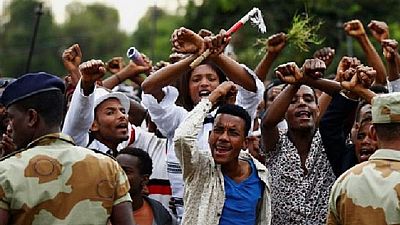



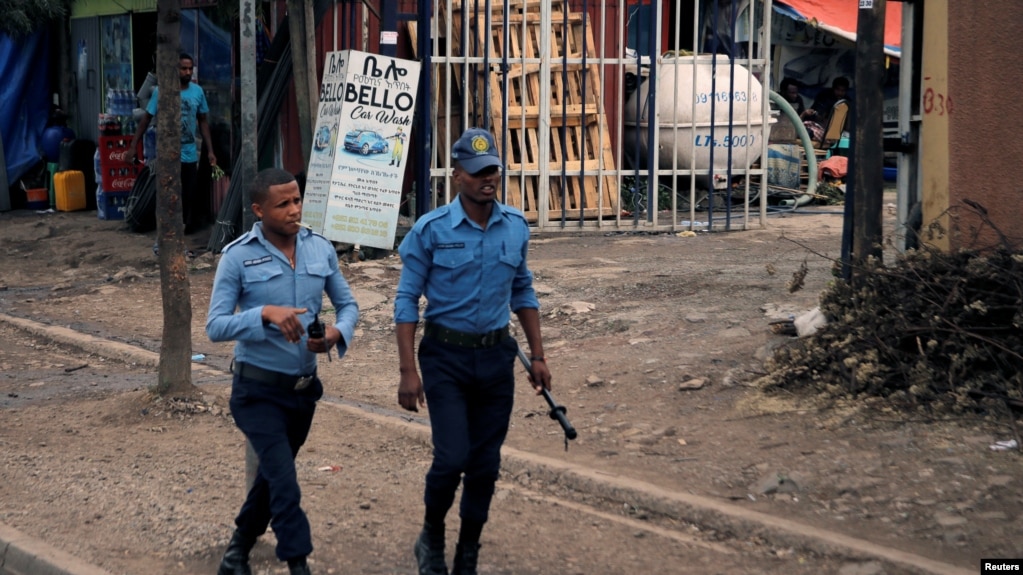
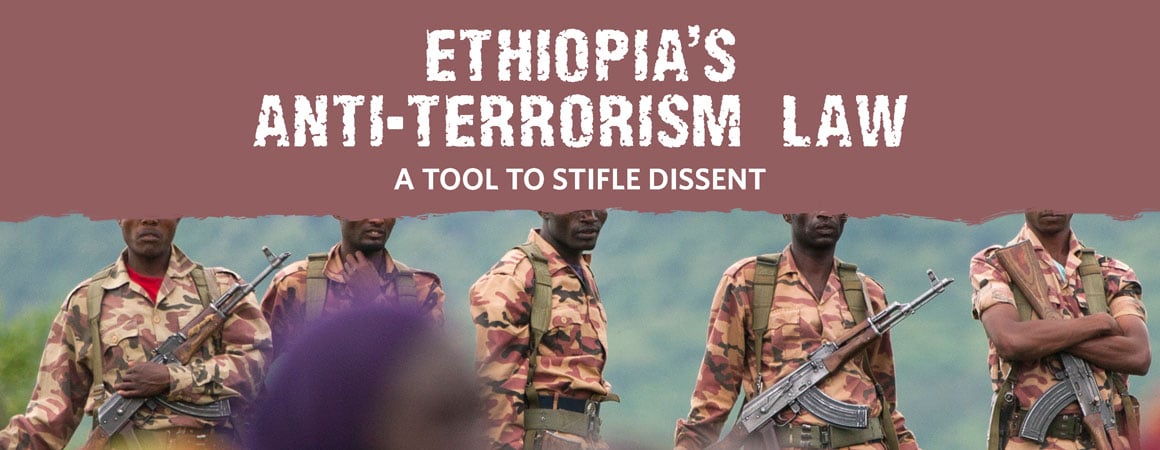














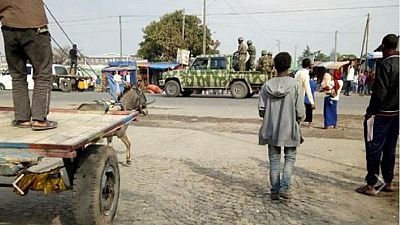
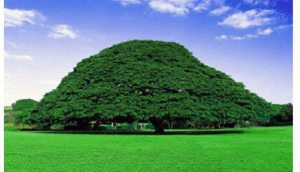
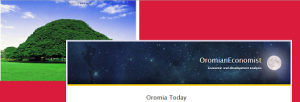








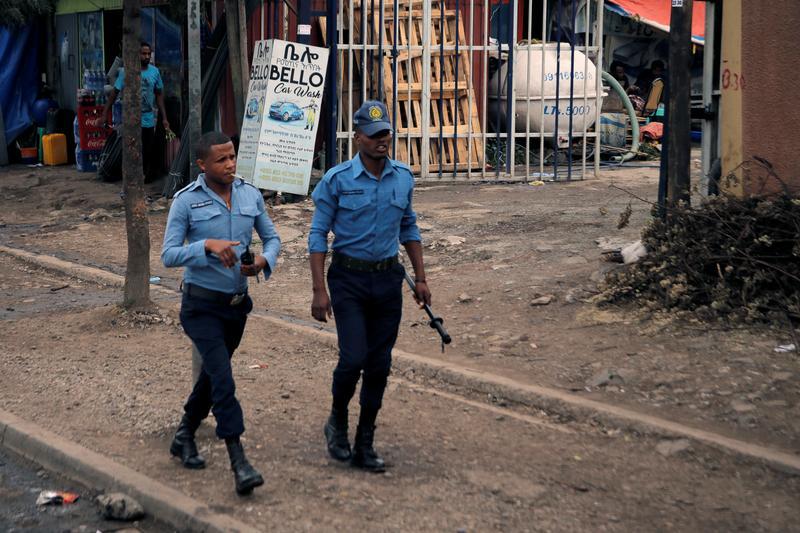




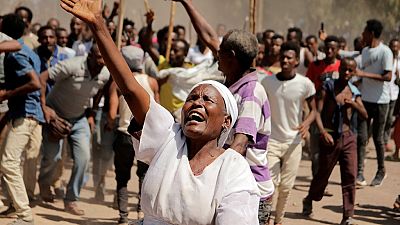


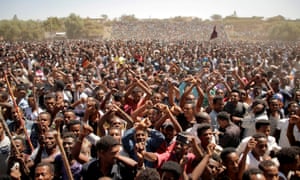
![Ethiopia declares state of emergency after PM quits Ethiopia's prime minister resigned on Thursday amid widespread public protests [Tiksa Negeri/Daylife]](https://i0.wp.com/www.aljazeera.com/mritems/imagecache/mbdxxlarge/mritems/Images/2018/2/16/67d066f79c5d43ae8b978280230d8a7f_18.jpg)

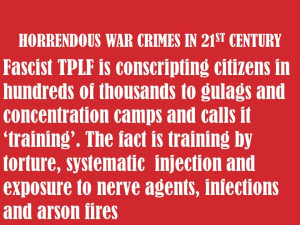
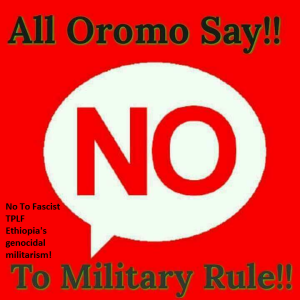






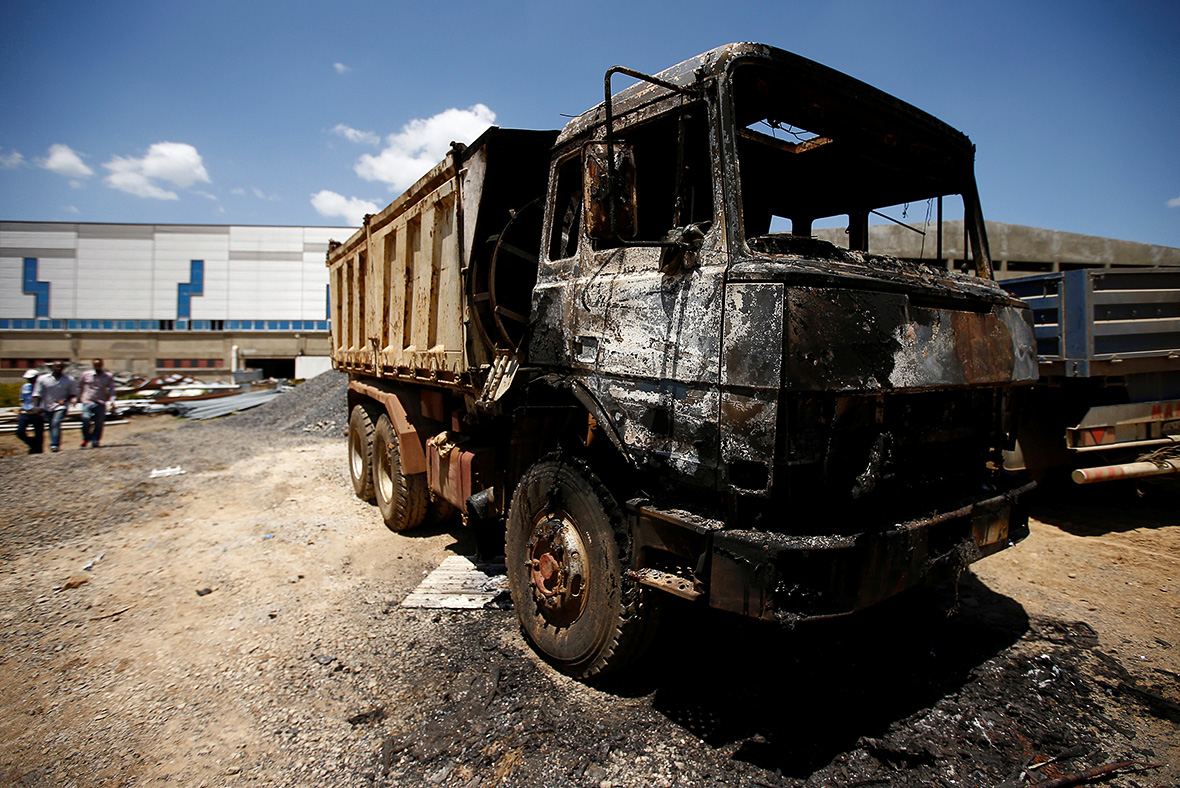



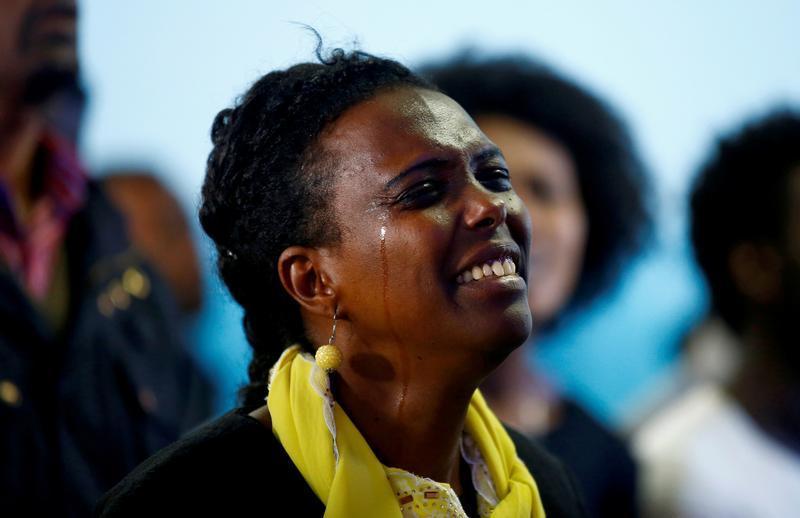
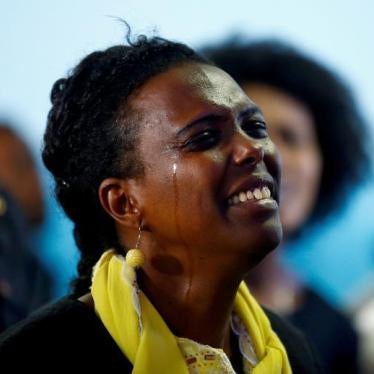
















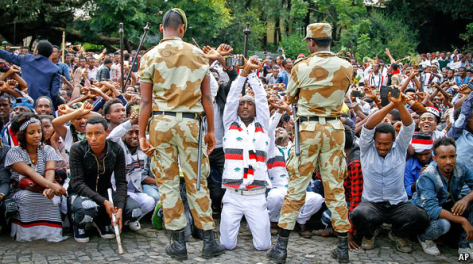




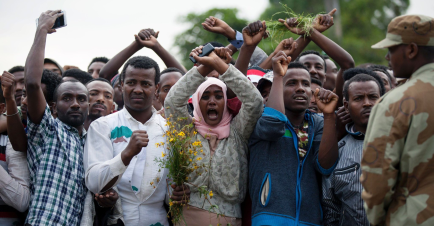
















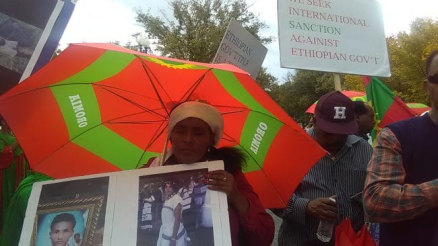





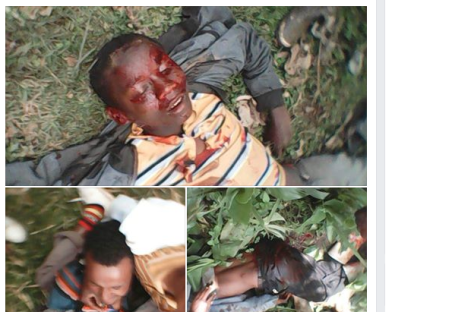
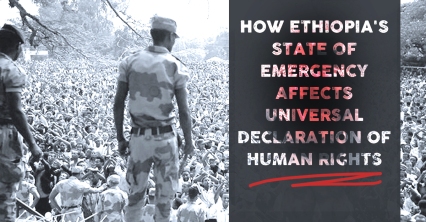





You must be logged in to post a comment.